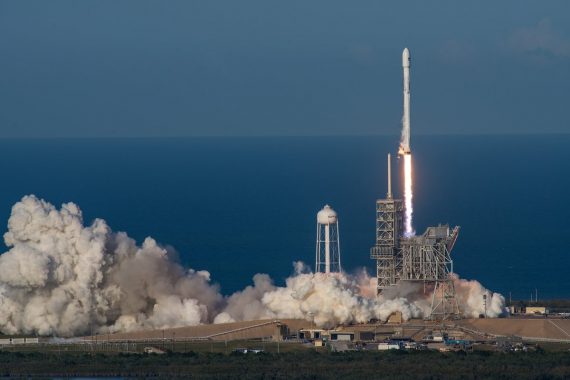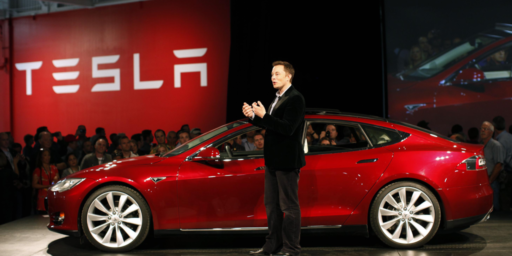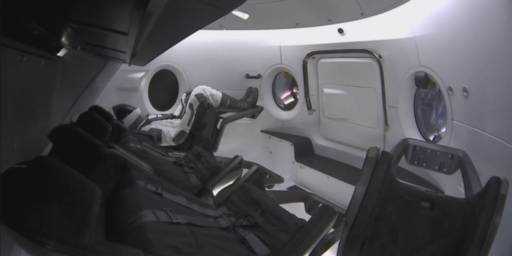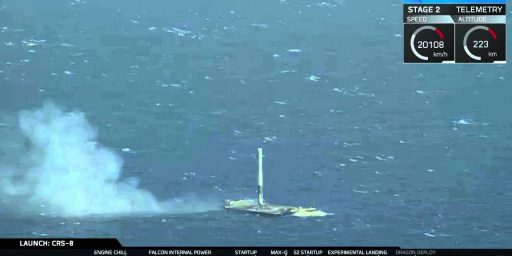SpaceX Now One Of The World’s Most Valuable Privately-Held Companies
In a short period of time, SpaceX has become a huge success, as has the commercial space launch industry.
SpaceX, the company owned by Elon Musk that has been at the forefront of a growing private space launch industry, is now one of the most valuable privately-held companies in the world:
SAN FRANCISCO — SpaceX, the rocket maker founded by billionaire Elon Musk, has raised up to $350 million in new financing and is now valued at around $21 billion, making it one of the most valuable privately held companies in the world.
SpaceX’s new financing was disclosed in public filings that were obtained by Equidate, a marketplace for private company stock. SpaceX declined to comment.
With the latest funding round, SpaceX joins an elite club of seven venture-backed companies valued at $20 billion or more around the world, according to research firm CB Insights. Investors have poured money into the companies, many of which operate capital intensive businesses such as Uber and Airbnb, even as smaller start-ups have gone public and have seen their valuations waver.
Snap, the messaging and entertainment company, went public in March at a market capitalization of $24 billion, which has since fallen to about $16.5 billion. Meal delivery company Blue Apron went public last month at a market capitalization of $1.9 billion, which was less than its private market valuation; that has since dropped to around $1.3 billion.
Still, investors have long believed that a handful of companies have the potential to become globally dominant businesses. Five companies based in the United States that are valued at more than $20 billion — including Uber, Airbnb and WeWork — have upended established industries like transportation and real estate. Palantir, the analytics company that is in the $20 billion-plus valuation club, is vying to become a major government contractor, as is SpaceX.
The two other closely held companies valued at more than $20 billion are in China — ride-hailing company Didi Chuxing and consumer electronics maker Xiaomi.
SpaceX’s latest funding nearly doubles the valuation of the company, which was pegged at around $11 billion when it raised $1 billion from Fidelity and Google in 2015. Previous investors in SpaceX include venture capital firms Founders Fund and DFJ.
SpaceX is best known for Mr. Musk’s goal of colonizing Mars, but it is also a key player in the business of sending commercial satellites into space.
In September, the company suffered a major setback when one of its Falcon 9 rockets caught fire on the launchpad and exploded, destroying a $200 million satellite. SpaceX resumed launching in January, and, after years of failing to meet its promises, the company has finally achieved a steady cadence, with 10 launches already this year. By the end of the year, SpaceX hopes to finally get its bigger, years-delayed Falcon Heavy rocket off the ground.
In March, the company launched a partly used, less expensive rocket, with the aim of bringing down the cost of sending supplies into space. Replicating such flights with reusable rockets is key for Mr. Musk’s vision of sending people to Mars.
“It means you can fly and refly an orbital class booster, which is the most expensive part of the rocket,” Mr. Musk said at the time.
Notwithstanding last September’s setback, SpaceX has been the most prominent and most successful of all the companies seeking to gain ground in the private space launch business. For example, it has become the near-exclusive source of launch vehicles for cargo runs to the International Space Station from the United States and is currently working with NASA on a version of its Dragon delivery vehicle that can take astronauts to and from the ISS on a reliable basis. If that’s successful, then the United States will no longer have to rely on the Russian space program and its decades-old Soyuz spacecraft to get astronauts to the station, and will be able to concentrate NASA’s manned efforts on more ambitious projects such as a return to the Moon that is currently planned for some time in the 2020s. Eventually, of course, there is the goal of getting a manned mission to Mars, and Elon Musk, the founder and principal owner of SpaceX who also owns and operates electric car pioneer Tesla Motors, has his own goal of getting there before any conceivable or proposed government-led effort. Much of that depends on the success of the upcoming Falcon Heavy rocket, which would both allow SpaceX to propel satellites into higher orbits, an advance that would be of great help in giving it expanded access to launching satellites for the Federal Government or foreign nations, although it would be presumably limited in its ability to enter into those contracts by the need to get clearance from Washington, D.C.
SpaceX isn’t alone in the private space launch business, of course, General Dynamics, a long-standing contractor that has been involved in developing elements of various NASA launch vehicles as well as military equipment, has its own private launch endeavor. Boeing, meanwhile, is the primary contractor for the newest NASA launch vehicle, the Space Launch System, which NASA plans to use for the Orion program and other missions designed to send unmanned, and eventually manned, missions into deep space beyond the Earth-Moon system. Also competing with SpaceX is a company called Blue Origin, owned primarily by Amazon founder Jeff Bezos who for a few days last week at least qualified as the richest man in the world, displacing Microsoft founder Bill Gates when Amazon’s stock high a high before retreating somewhat by the end of the week. So far at least, though, none of SpaceX’s direct competitors have managed to equal its success.
As I noted more than five years ago after the SpaceX’s Dragon’s first successful delivery to the International Space Station, we’re still just at the beginning of a new and exciting era in the history of man’s space exploration.






Because of spellcheck, the most common error I see these days, and I see it on a daily basis, is someone leaving an entire word out of a sentence. Which seems bizarre to me. But I literally can’t go a day without seeing it.
Although here it could be a case of leaving an erroneous word in.
Okay so you found an error that I made that has now been corrected.
I hope it was the highlight of your weekend 🙂
It can’t be a highlight, because I see it every day. It’s bizarre.
Well, we tried to develop a private space industry back in the 80s (American Rocket Corp, anyone) and it drove everyone crackers because NASA kept flipping between a) charging large amounts to launch stuff, and b) not charging at all or very little. I was heavily involved in the NSS back then and remember the discussions we had about how it was impossible to plan any market development under such circumstances. OR raise capital.
Governments who want to encourage the development of a private space industry need to be consistent with the signals they send to the market. Charge something high–or charge something low–but at least stick to the original pricing and let the market adapt.
@grumpy realist:
United Launch Alliance (ULA), the joint venture between LM and Boeing, seems to have figured out the solution to this. Instead of selling launch vehicles to the government, they now sell launch services, in two different ways:
1. Outfitting and launch of specific payloads
2. Maintenance of ongoing lift capability
Each of those has its own contract, and they are roughly equal in size. The latter is the genius play, as best I can tell — it means that the government not only pays when they aren’t launching anything (so as to keep the capability for lift-on-demand intact), but it creates a serious barrier to competition from the SpaceXes of the world, who aren’t getting that subsidy.
I’m extrie-excited to see Musk’s government-subsidized company using technology from government labs zoom to losing ever more money so Elon can escape to his Martian outpost.
If all the billions he’s raked in on government dole don’t prove that free market utopia is the future, what will?
Thank you for this analysis. I see it as cautionary. The companies that actually went public are currently valued at a substantial discount to the values that were proclaimed when they were in private hands. I know very little about the stock market, but I have a gut feeling that there is a lot of hot air out there. Prices have risen a lot since February 2009 as have real estate prices. Perhaps, a little caution is in order.
Ben touched on it. NONE of Elon Musk’s companies is making money. Basically just schemes for getting grants and suckering investors.
@Dave Schuler:
And producing one of the most highly-praised cars ever. Which is more than we usually get from government subsidies.
While I have mixed feelings about Musk (read the Ashley Vance book and you’ll see why), being a government contractor is not the same thing as being “on the dole”, which refers to government unemployment benefits. SpaceX launches for $1,233/lb when fully loaded, which is a serious cost savings to the taxpayer and private satellite firms. And they’re working maniacally to make reusable stages a reality, which could seriously reduce costs further. Yeah, they’re currently unprofitable, but how long was Amazon unprofitable?
@Doug Mataconis: Doug, one of the responsibilities of a professional writer is to produce sentences that can be read and understood. The standards on that responsibility are notably more lax for blogging, but remain in place. When someone makes an observation like the one you just had a little hissy fit about, that person is providing a service to you.
You could try to be a little more gracious considering the number of your sentences about which I find myself wondering what you actually intended to say.
@michael reynolds: And the Model X and the Model 3 or S, I forget which, are rated as the safest vehicles Ever, in their categories.
@Slugger: But… but… this is the free market you’re talking about. Come on. What could go wrong? The Dot Com bubble was an aberration. Never happen again!
That’s just a pet peeve of mine because it’s so weird. In the 90’s I was a print journalist under a different name, doing both straight news and features, and in the print world you’d have misspellings, and run-ons, and accidental splices, but I literally never once saw a word just missing from a sentence. But on the web I see it Every. Day. On Vox, Slate, Mother Jones, Business Insider, Forbes, WaPo, TechCrunch, The Verge, Cnet, etc etc. I can’t understand what it is about this medium that makes such an odd error so frequent.
@teve tory:
1. Spell-checker
It’s smart enough to tell you “neccesary” should be “necessary,” but not smart enough to tell you that you’ve elided a word entirely. Something underlined in red tends to get noticed.
2. Edit as you go
I can’t speak for everyone, but on-line I tend to edit sentence by sentence, quick preview, minor polish, then post. Very light editing.
3. Our brilliant/stupid brains
While editing, our brains fill in the missing words easily because it knows what we intended to say not what we actually wrote.
@Dave Schuler:
What about Paypal?
It’s no longer of his companies.
At the that it was his company, did it fit your thesis?
@Dave Schuler:
Well, if you ignore things like putting stuff in orbit…
Are you pining for some past Golden Age when R&D wasn’t government-funded? You seem not to be aware that the fraction of US R&D that is government-funded is lower than it has ever been at the moment.
@teve tory:
On another thread not an hour ago I wrote:
I missed the first “get” even though I looked at it three times. One set of eyes combined with brilliant/stupid brain. The mind fills in the gap very easily. You literally don’t see it.
@de stijl: If it helps any, the reasons that you noted in your earlier post are what research into editing errors tends to show. If I could have a nickel for every time I’ve seen a word that I didn’t write in my text or shown students that a word they’re positive they wrote isn’t actually there…
(Sometimes they still see it the first two times and I have to show them that it is missing by having them read the sentence in reverse order the third.)
@de stijl: Yeah, after pondering it a bit, I think the answer is that 20 years ago when I was writing for print, nothing ever made it into a paper or a magazine without at least one other person reading it. Whereas on the web the writer is often the instant publisher, and, like you said, the writer’s brain can fill in gaps. (which brains do a lot of)